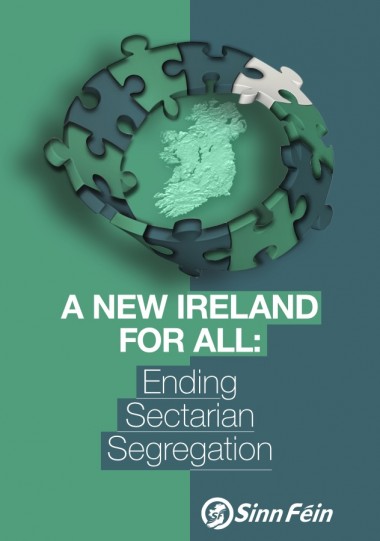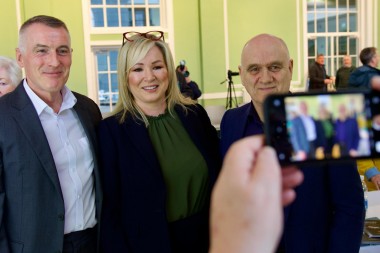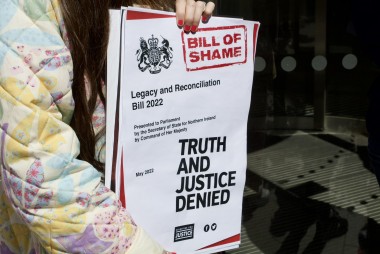4 May 2024
We must not give up on reconciliation: Hope must be kept alive
by Declan Kearney

In moving forward, our shared challenge must be to make the political process work, and to plan for the next 25 years. That means preparing for and winning a unity referendum in this decade, while at the same tackling sectarianism and advancing reconciliation.
Sinn Féin’s latest policy document, ‘A New Ireland for All: Ending Sectarian Segregation’ was launched in Ionad Eileen Howell on 10 April.
This date was chosen because it marked the 26th anniversary of the ‘Good Friday Agreement’ (GFA). The policy was endorsed at the Party Ard Fheis in November 2023. It is Sinn Féin’s fourth policy contribution to addressing how the scourge of sectarianism is tackled, and reconciliation is achieved in Ireland; following the adoption and publication of previous policy positions in 2016, 2017 and 2019.
This new policy builds on the previous policy frameworks and reaffirms Sinn Féin’s commitment to the development of a reconciliation process. However, it also places the challenges of ending sectarian segregation, healing the legacy of the past, and achieving reconciliation into the context of shaping and implementing public policy, and the role of democratic political institutions.

It makes clear that confronting sectarian segregation and ending the cycle of sectarianism requires a constant focus; and needs to be embedded within public policy processes, which are future proofed.
In response, Davy Adams, a columnist, and a former unionist politician and international aid worker, published a very thoughtful op-ed in the Irish News, welcoming the policy as a positive contribution to the search for reconciliation in the here and now.
He also commended the focus upon ending sectarian segregation, but in context with its correlation to social and economic inequalities.
Coincidentally, the launch occurred just over eight weeks after the restoration of the power sharing institutions in the north.
Sinn Féin Vice President, Michelle O’Neill, and First Minister leading the power sharing coalition, was a keynote speaker.
The other main speaker was Denzil McDaniel, a former newspaper editor, author, and media commentator. He highlighted the importance of the new policy, but also said that following through on convincing people from the unionist section of our community, who do not want to listen, will be difficult and crucial work.
While Denzil spoke about the diverse make up of those from unionist or protestant backgrounds, and noted that more individuals are emerging from these sections of society who favour a new Ireland, he also emphasised that the voices must be heard of those who do not favour constitutional change, and who remain hostile to republicanism.
He pointed out the reality that many unionists are in denial about the momentum towards Irish unity, but that through dialogue an opportunity exists to build something exciting and new.
Denzil was correct to focus upon the depth of pain that remains within our post conflict society, and the obstacles to achieving reconciliation.

The legacy of the historic and recent past casts a very long shadow. Over 100 years after Ireland’s civil war, no effective reconciliation process was ever undertaken by the southern state to deal with that catharsis in our country’s history.
The coming into effect of the British government’s obscene ‘Amnesty Law’ on 1 May has now made the challenge of dealing with our unresolved past even more toxic.
In the weeks leading up to that date, the British government has intervened to disrupt inquests taking place where it has already been established that state agents were involved in carrying out sectarian murders as far back as the 1990s.
This new law is a cynical attempt to deflect away from Britain’s dirty war in Ireland. It is clearly designed to derail the many campaigns for truth and justice led particularly, but not exclusively, by families whose loved ones were killed by British state forces, or their agents.
The denial of truth and justice in multiple cases for over 50 years has caused deep distress and grievance.
It is incontestable that the suffering in pain caused in the past is now intergenerational.

Some suggest that our society should simply accept that the legacy of the past is intractable and will only be resolved with the passage of time: That truth and justice, and resolution are elusive.
Sinn Féin refutes that contention.
It is a political and moral imperative to deal with the past. It is fundamental to achieving reconciliation and creating a society at peace with itself.
We must not give up on reconciliation. Hope must be kept alive.
The party’s new policy reiterates Sinn Féin’s call for an initiative of common acknowledgement, which recognises all past injustices, hurt, and loss.
It pledges our commitment to continue seeking support for a National Reconciliation Day, which remembers all victims, from all sides, of the conflict in Ireland.
Other places have lived through the darkness of genocide in the modern world and have managed to create pathways to reconciliation and healing.
What has happened in the past cannot now be undone, but with committed leadership, new futures are possible.
Twenty-six years on from the signing of the Good Friday Agreement, it is time to open up a new phase of the Irish peace process.
We may never agree about the past, but we can resolve to ensure it is not repeated.
Any reconciliation process will need to be concrete, not abstract. It will need to be mainstreamed with widespread support and made relevant to the realities of our society in the present time.
That will not mean having to forget, or necessarily even having to forgive; that is an individual decision. However, it should include a willingness to agree to disagree well; embracing both cooperation and coexistence, and, managing difference with equality and respect.
Political and civic leadership must be paramount. That is why ‘A New Ireland for All’ contends that the democratic political institutions throughout Ireland should play a central role in promoting both reconciliation and healing.
.jpg)
In moving forward, our shared challenge must be to make the political process work, and to plan for the next 25 years. That means preparing for and winning a unity referendum in this decade, while at the same tackling sectarianism and advancing reconciliation.
There is no contradiction. National reconciliation and national reunification are interdependent.
‘A New Ireland for All’ provides a framework of realistic and deliverable measures, and points a way forward to the achievement of a new rights based, inclusive national democracy.
I would urge everyone to read, share and discuss its ideas.
Read the full policy document here: A New Ireland Doc
Follow us on Facebook
An Phoblacht on Twitter
Uncomfortable Conversations

An initiative for dialogue
for reconciliation
— — — — — — —
Contributions from key figures in the churches, academia and wider civic society as well as senior republican figures





